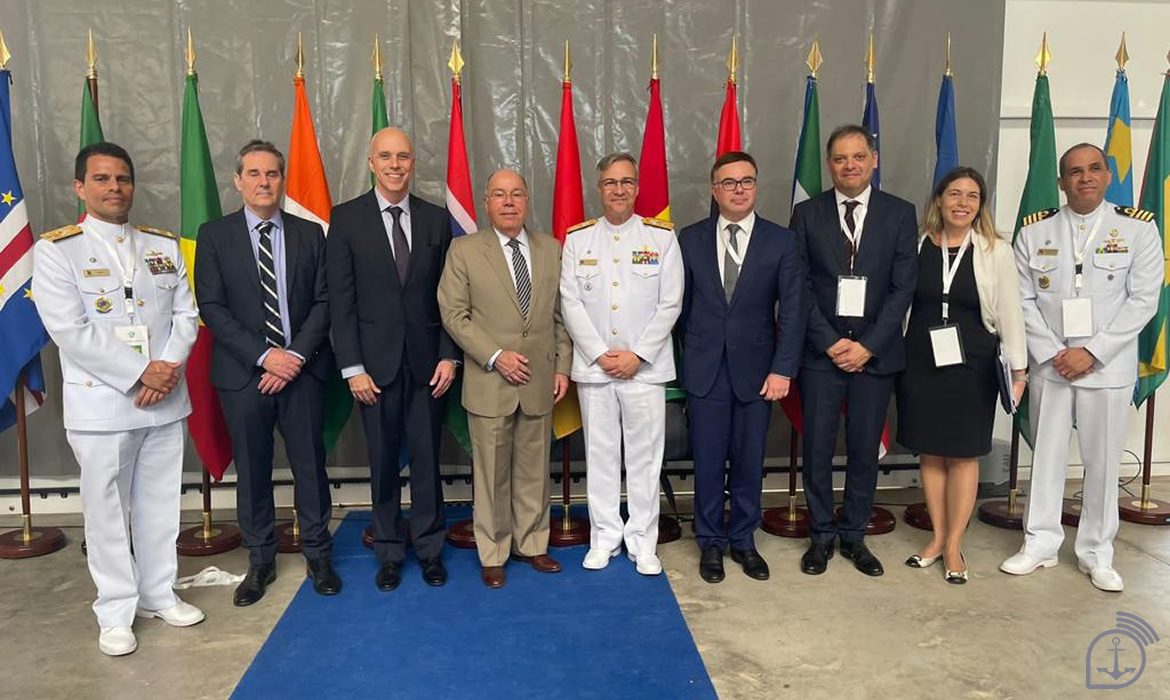The Brazilian Navy integrates the Brazilian delegation that participates in the VIII Ministerial Meeting for the strengthening and institutionalization of the area
By First Lieutenant (RM2-T) Tássia Navarro – Brasília,DF
After 10 years without meetings, the city of Mindelo, in Cape Verde, hosted the VIII Ministerial Meeting of the South Atlantic Peace and Cooperation Zone (ZOPACAS), on April 17 and 18. The last meeting had been held in Montevideo, Uruguay, in 2013. In all, 16 of the 24 member countries met to discuss and finalize the Mindelo 2023 declaration and action plan. In addition, it was established that the IX meeting of ZOPACAS will be held in Brazil.
The Brazilian Navy (MB), the Ministry of Defense (MD) and the Ministry of Foreign Affairs (MRE) are part of the Brazilian delegation that participated in ZOPACAS. The Brazilian delegation was headed by the Minister of Foreign Affairs, Chancellor Mauro Vieira. The MD was represented by the Chief of Staff of the Navy, Admiral of Fleet José Augusto Vieira da Cunha de Menezes.
During the meeting, the Foreign Minister highlighted the strategic importance that the MB attaches to cooperation in the area of naval operations in the South Atlantic. “The South Atlantic is vital to all our societies, and maintaining its peaceful character must be our top strategic priority. To do this, we must have the capability to patrol and defend it. The Brazilian Navy is committed to this purpose. And here, I take the opportunity to recognize the presence of the Chief of Staff of the Brazilian Navy, Admiral of Fleet José Augusto Vieira da Cunha Menezes, who is leading a large delegation of officers to this meeting,” he said.
Admiral Cunha underscores Brazil’s importance in contributing to the promotion of peace, security and stability in its strategic environment, which includes South America, the South Atlantic and countries bordering West Africa. “The strengthening and institutionalization of ZOPACAS are viable actions to increase maritime security and socioeconomic development in Brazil’s strategic environment. The recent instability caused by acts of piracy in the Gulf of Guinea requires increased cooperation, exchange of experiences, and presence actions among friendly countries in the region, since the South Atlantic has enormous potential to be exploited and numerous related threats,” he said.
South Atlantic Zone of Peace and Cooperation
The ZOPACAS was established on October 27, 1986, by means of UN Resolution 41/11, fruit of a Brazilian initiative, supported by Argentina. It was created with the purpose of promoting regional cooperation, peacekeeping and security around the 24 countries, with coasts in the South Atlantic, that joined the project.
Brazil in ZOPACAS
After the 1st Ministerial Meeting, in Rio de Janeiro (1988), there followed those of Abuja, Nigeria (1990); Brasilia, Brazil (1994); Somerset West, South Africa (1996); Buenos Aires, Argentina (1998); Luanda, Angola (2007); and Montevideo, Uruguay (2013).
In August 2019, the MB, with the collaboration of the United Nations Division of the MRE, held, in Brasilia (DF), in person and by video conference, a workshop with the theme “ZOPACAS and Security in the South Atlantic”. The objective was to enhance the theme, update knowledge and ground future initiatives of the Force.
On December 16, 2019, the Brazilian Mission to the United Nations in New York convened a meeting at the expert level. Then, on October 27, 2020, the Symposium “The contribution of ZOPACAS to Economic Development and Maritime Security in the South Atlantic” was held.
In 2021, the current rotating presidency of ZOPACAS presented a draft resolution on the zone, to be submitted to the 75th Session of the United Nations General Assembly. This was adopted as resolution A/RES/75/312. The line of cooperation of the previous resolution was maintained, incorporating elements such as the definition of a development forum and the strengthening of cooperation in areas such as: science and technology; education; training; coastal surveillance; environment; defense; strengthening of national institutions; trade; sports; tourism; economy; communications; transportation; culture; and political dialogue.
Source: Agência Marinha de Notícias
